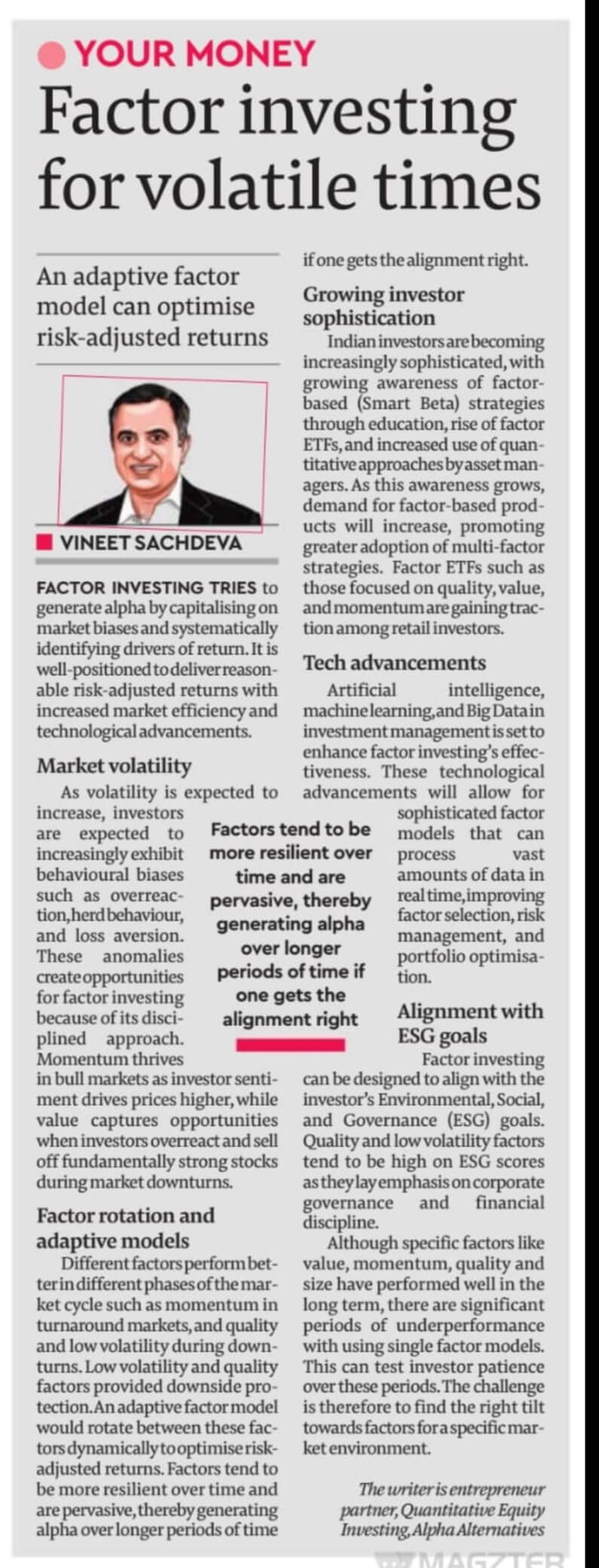
The Case for Factor Investing
Authored by Vineet Sachdeva, Entrepreneur Partner-Quantitative Equity Investing, Alpha Alternatives
Monday May 2024
Factor investing tries to generate alpha by capitalizing on market biases and systematically identifying drivers of return. Globally, factor-based strategies have $1.6 Trillion assets under management. India it is still at nascent stages, and therefore primed for growth. We feel that this will become larger in the future because of:
- Continued market volatility and behavioural anomalies: With the advent of technology, and access to reams of 24/7 data, volatility is expected to increase. In this scenario, investors are expected to increasingly exhibit behavioural biases such as overreaction, herd behaviour, and loss aversion. These anomalies create opportunities for factor investing because of its disciplined approach. Momentum thrives in bull markets as investor sentiment drives prices higher, while value captures opportunities when investors overreact and sell off fundamentally strong stocks during market downturns.
- Technological advancements and data availability: The proliferation of artificial intelligence (AI), machine learning (ML), and big data in investment management is set to dramatically enhance factor investing’s effectiveness. These technological advancements will allow for more sophisticated factor models that can process vast amounts of data in real time, improving factor selection, risk management, and portfolio optimization. AI-powered models can assess a wider array of alternative data (such as social media sentiment, satellite data, and web traffic) to enhance traditional factor models. For instance, momentum strategies could be refined by including real-time news sentiment analysis, while quality and value strategies could be improved by leveraging alternative data sources for deeper insights into corporate fundamentals.
- Factor rotation and adaptive models: One of the core advantages of factor investing is the ability to dynamically rotate between factors based on market conditions. As different factors perform better in different phases of the market cycle (e.g., momentum in turnaround markets, and quality and low volatility during downturns), future factor strategies will likely integrate adaptive models that optimize factor exposures in real time e.g. during the COVID-19 pandemic, low volatility and quality factors provided downside protection, while during the subsequent recovery phase, momentum, size and value factors outperformed, as investor confidence returned. An adaptive factor model would rotate between these factors dynamically to optimize risk-adjusted returns. Factors tend to be more resilient over time and are pervasive, thereby generating alpha over longer periods of time if one gets the alignment right.
- Growing investor sophistication and awareness: Indian investors are becoming increasingly sophisticated, with growing awareness of factor-based (Smart Beta) strategies through education, rise of factor ETFs, and increased use of quantitative approaches by asset managers. As this awareness grows, demand for factor-based products will increase, promoting greater adoption of multi-factor strategies. It is also easier to align investor risk-return profile with factor-based strategies. Factor ETFs such as those focused on quality, value, and momentum are gaining traction among retail investors.
- Alignment with ESG and Governance Trends: Environmental, Social, and Governance (ESG) considerations are becoming more prominent globally and in India. Factor investing can be designed to align with the ESG goals of the investor. Typically, quality and low volatility factors tend to be high on ESG scores as they lay emphasis on corporate governance and financial discipline. As the demand for socially responsible investing grows, these stocks will continue to be in demand, driven by both fundamental strength and ESG tailwinds.
Conclusion: Factor investing is well positioned to deliver reasonable risk-adjusted returns in the Indian market. The structural growth of the Indian economy, combined with increased market efficiency, technological advancements, and the dynamic adaptability of factor models, would ensure that factor-based strategies will remain relevant and effective. Additionally, growing investor awareness, alignment with ESG themes, and the ability to capitalize on persistent behavioural biases will fuel continued demand for factor-based strategies.
Although specific factors like Value, Momentum Quality and Size have performed well in the long term, there are significant periods of underperformance with using single factor models. This can test investor patience over these periods. The challenge is therefore to find the right tilt towards factors for a specific market environment. We are therefore poised for interesting times in the world of Factor Investing.
Disclaimer: An investment with Alpha Alternatives (including its subsidiaries) is suitable only for sophisticated investors and requires the financial ability and willingness to accept the high risks and lack of liquidity inherent in any such investment. This document is not intended to be comprehensive or to provide specific investment advice or services. The document is not in any form a substitute for such professional advice or services, and it should not be acted on or relied upon or used as a basis for any decision or action that may affect you or your business. Before deciding to invest, prospective investors should read the definitive offering and subscription documents and pay particular attention to the risk factors contained therein. Persons who are not relevant persons must not act on or rely on this document or any of its contents. Any investment or investment activity to which this document relates is available only to relevant people and will be engaged only with relevant people. Any decision or action taken by you based on the information contained herein is your responsibility, and Alpha Alternatives is not liable in any manner for the consequences of such a decision or action. In deciding whether to make an investment with Alpha Alternatives, you must rely on your own evaluation of the terms of the proposed investment and the merits and risks involved, and, if applicable, upon receipt and careful review of any confidential memorandum, prospectus, or similar documents, and you should consult your legal, tax, investment, or other advisor. The contents of this document do not constitute and should not be construed as legal, tax, or investment advice. Although Alpha Alternatives has used all reasonable efforts to ensure that the information provided in this document is correct, Alpha Alternatives and its members, partners, stockholders, managers, directors, officers, employees, advisers, representatives, and agents make no representation and give no warranty that such information is accurate, complete or current, and you should not rely on the information provided in this document for any purpose.






























